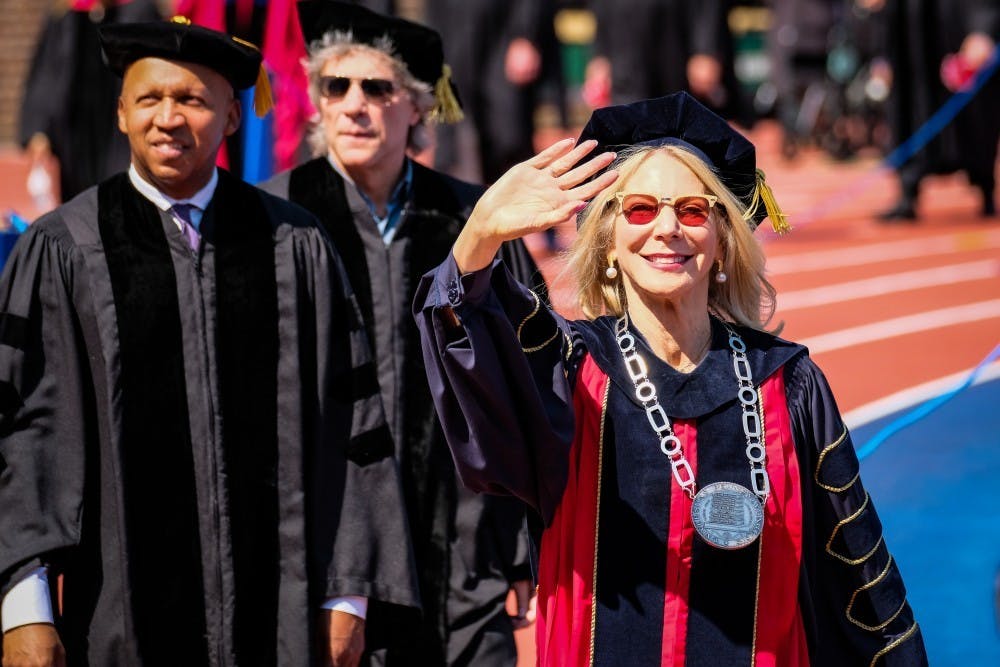
While students largely embrace Penn President Amy Gutmann’s nomination to be the next United States ambassador to Germany, some expressed concerns about the University's transition of leadership.
Credit: Son NguyenStudents largely embrace Penn President Amy Gutmann’s nomination to be the next United States ambassador to Germany as a welcome opportunity for both Penn and the United States. However, several expressed uncertainty about the University’s transition to new leadership.
The White House officially announced in a press release on July 2 that President Joe Biden would nominate Gutmann to be the next United States ambassador to Germany. In an email sent to the Penn community hours after the press release, Gutmann said she intends to serve as Penn president until June 30, 2022, as originally intended, or until the Senate confirms her ambassadorship.
Gutmann’s impending departure is the third major change to University leadership this year. Former Board of Trustees Chair David Cohen ended his term on June 30, and the University announced on May 11 that Penn Provost Wendell Pritchett will be taking a medical leave of absence through the end of the fall 2021 semester.
Rising College senior and Undergraduate Assembly President Tori Borlase explained that the UA meets with the University president yearly to advocate for the concerns of students, adding that the meeting might not be possible this year because of the uncertainty surrounding the exact date of Gutmann’s departure. She added that the process of appointing a new University president might also affect whether the UA will be able to meet with the University president this year.
“If she’s leaving at any possible moment, will we even get to meet with the president of the University this year? I’m not sure,” Borlase said.
Rising Wharton junior and 2023 Class Board President Derek Nhieu shared Borlase’s concerns, adding that Gutmann’s departure will be a “big change” for the University because she is Penn’s longest-serving president.
Rising College senior Sumant Rao said he is nervous about who the University will appoint to be the next president, noting that students usually do not get to voice their opinions when decisions regarding University leadership are made.
“I would hope that [the] new president [will] be quite receptive to student feedback and [will] also use Penn’s platform to not only provide a world class education for its students but [also to] work to make the local community and broader community stronger and a better place,” rising College senior and 2022 Class Board President Sam Strickberger said.
Several students said that the nomination did not come as a surprise because of Gutmann’s close relationship to President Biden. Under Gutmann’s leadership, Biden became an honorary professor in 2017 and established the Penn Biden Center for Diplomacy and Global Engagement in 2018. Between 2017 and 2019, Biden earned more than $900,000 from Penn, The Philadelphia Inquirer reported.
Gutmann’s close relationship to Biden has been criticized by experts who have challenged Gutmann’s qualifications for the ambassadorship and Biden’s reasons for appointing her.
Rao said that while Gutmann’s path to an ambassadorship is “unconventional,” Biden’s choice is not solely based in nepotism.
“The way political appointments for ambassadorships work is that they usually give them to people who help [them] get elected,” Rao said, noting that Biden’s ties to Penn and Gutmann helped his presidential campaign.
Nhieu agreed with Rao, adding that while he understands that people may be concerned about Biden’s motives, he believes Biden chose Gutmann because he is familiar with her qualifications and her ability to perform the duties of the position.
Rising College junior Oliver Stern said he believes Gutmann’s ambassadorship and Biden’s ties to Penn are beneficial to the University because they reinforce Penn’s connection to politics.
“I think we have to ask ourselves, ‘Is it worth it to have the Biden name attached to Penn?’ And I think it really is,” Stern said. “I think by merely having Biden as a practicing professor — even if he doesn’t teach classes — that name association enables us to essentially get more access to [Washington, D.C.] and other politicians and public servants.”
Strickberger said that Gutmann — whose father fled to the United States from Germany at the start of the Holocaust in 1934 — is a good nominee for the ambassadorship because of her personal ties to Germany.
“I think there’s a redemptive quality to the daughter of a Nazi Germany refugee becoming [the] ambassador to Germany,” Strickberger said. “It’s a powerful position from which she can promote justice and empathy on the world stage.”
For rising Wharton junior and Penn German Society Co-President Leontij Potupin, Gutmann’s nomination is a positive step towards rebuilding the United States’ relationship with Germany.
Potupin said he hopes the Penn German Society can host Gutmann for future speaker events. The Penn German Society hosted a speaker event in May with Emily Haber, Germany’s ambassador to the United States.
“I think it’s a great opportunity for Penn to solidify our reputation as the ‘public service Ivy’ and basically demonstrate to the country and the world that Penn is a global center of public service and diplomacy,” Stern said.
The Daily Pennsylvanian is an independent, student-run newspaper. Please consider making a donation to support the coverage that shapes the University. Your generosity ensures a future of strong journalism at Penn.
Donate







